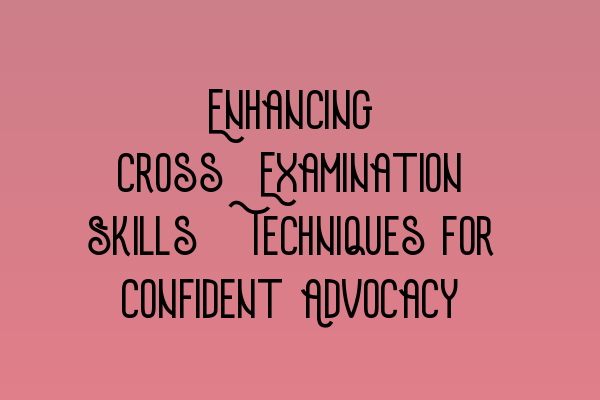Enhancing Cross-Examination Skills: Techniques for Confident Advocacy
Welcome to the SQE Criminal Law & Practice Law UK blog! In this article, we will explore techniques to enhance your cross-examination skills, helping you become a confident advocate in the courtroom. Cross-examination is a critical aspect of the legal profession, and mastering this skill can significantly impact your success as a lawyer. So, let’s dive right in!
Why is Cross-Examination Important?
Cross-examination is the process of questioning a witness who has already testified on behalf of the opposing party. It allows you to challenge their credibility, test their version of events, and uncover inconsistencies or weaknesses in their testimony. Cross-examination is your opportunity to strengthen your case and weaken the opposing side’s arguments.
However, effective cross-examination is not just about asking questions; it requires careful planning, strategizing, and the ability to adapt on the go. Below, we’ve outlined some techniques to help you improve your cross-examination skills:
1. Prepare Thoroughly
Preparation is key to successful cross-examination. Before entering the courtroom, thoroughly review the case facts, evidence, and witness statements. Identify potential areas of weakness in the opposing side’s case and develop a clear line of questioning to expose these weaknesses. Practice your questions to ensure they are clear, concise, and purposeful.
Remember, preparation is not a one-time event. You should continuously review and refine your cross-examination strategy as the case progresses and more information becomes available. Our SQE 1 Practice Exam Questions and SQE 1 Practice Mocks FLK1 FLK2 articles can help you in your preparation process.
2. Master the Art of Framing Questions
When cross-examining a witness, it’s essential to ask precise and pointed questions. Avoid open-ended questions that leave room for the witness to provide lengthy explanations. Instead, use leading questions that elicit a simple “yes” or “no” response. This allows you to control the narrative and focus the witness’s attention on specific facts or events that support your case.
Remember to be respectful and maintain a professional tone during cross-examination. Aggressive or confrontational questioning can alienate the jury and undermine your credibility as an advocate.
3. Actively Listen and Observe
During cross-examination, it’s crucial to actively listen to the witness’s responses and observe their body language. Pay attention to any inconsistencies or contradictions in their testimony. If a witness provides conflicting statements, calmly and methodically point out these discrepancies to weaken their credibility. The ability to recognize subtle cues and react accordingly is a valuable skill in cross-examination.
4. Use Visual Aids
Visual aids can be powerful tools to reinforce your cross-examination points. Maps, charts, diagrams, and photographs can help the jury better understand complex information or visualize the sequence of events. Always ensure that the visual aids are relevant, accurate, and admissible in court.
5. Maintain Control and Stay Calm
Cross-examination can be intense, emotionally charged, and unpredictable. It’s essential to maintain control over the courtroom and your emotions, even when faced with challenging witnesses or unexpected developments. Your demeanor and composure play a significant role in how the jury perceives your case. Stay calm, focused, and respectful throughout cross-examination to exude confidence and professionalism.
Now that you’ve learned some essential techniques to enhance your cross-examination skills, consider enrolling in our SQE 2 Preparation Courses and SQE 1 Preparation Courses to further develop your legal expertise.
Don’t forget to mark your calendars with the SRA SQE Exam Dates so you can plan your preparation accordingly.
Conclusion
Cross-examination is a fundamental skill for any advocate. By preparing thoroughly, framing precise questions, actively listening and observing, using visual aids, and maintaining control, you can enhance your cross-examination skills and become a confident advocate in the courtroom. Remember, practice makes perfect, so keep honing your skills and never stop learning.
We hope this article has provided valuable insights into enhancing your cross-examination skills. If you have any questions or would like to learn more, feel free to contact us at SQE Criminal Law & Practice Law UK.
